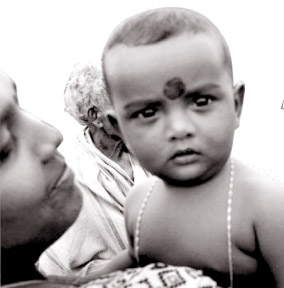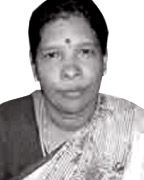Jaffna GA denies allegations of firing at civilians
Cardinal Malcolm Ranjith commends Govt for effective
policies, before LLRC:
*Role of Security Forces commended
*Need for political solution stressed
By Shanika Sriyananda

|

All civilians were well looked after by the Security Forces |
The controversial issue of Security Forces firing at civilians who
fled with white flags during the last stages of the final battle in May
2009, was questioned at last week’s sittings of the Lessons Learnt and
Reconciliation Commission (LLRC). Strongly denying the allegation,
former Government Agent for Mullaitivu Emelda Sukumar told the LLRC that
no civilian was shot at by the soldiers when they were fleeing LTTE
control during the final days of the battle.
Answering a query by LLRC Chairman C.R. de Silva, whether the
allegation that soldiers fired at civilians crossing the LTTE’s forward
defence lines with white flags was true, she said, “It was completely
false. I was the GA there from 2002 till January 2010. If such incidents
had taken place I should be aware of it. But such incidents were not
reported to me”, she said.
The LLRC was appointed by President Mahinda Rajapaksa to find the
root causes of the conflict and also to come up with concrete proposals
to prevent the recurrence of similar conflicts in future.
The eight-member committee headed by former Attorney General Chitta
Ranjan de Silva is also entrusted to recommend proposals to enhance
national unity and reconciliation among all communities. It was also
asked to find those persons or groups responsible for the 30-year
conflict which devastated the country’s future.
Sukumar, the present GA of Jaffna, said she knows that the LTTE did
not allow the civilians to flee and used them as a human shield in the
State-declared ‘No Fire Zones’.
She said two of her drivers who had fled the LTTE-controlled areas
carrying white flags had told her their story. She had also met
civilians in welfare centres in Vavuniya who had surrendered to the
military, carrying white flags.
Civilian hostages
|

Cardinal Malcolm Ranjith
|
“They informed me how they were safely taken over by the soldiers and
transported to safe places”, she said.
Sukumar said the civilians wanted to abandon the LTTE, but the group
kept them as hostages as they wanted to survive. “The civilians were
caught up in the middle and when they tried to flee, they were shot dead
by the LTTE”, she said, adding that the LTTE had kept over 350,000
civilians in the Pudukudiyiruppu area in Mullaitivu as hostages.
She said the Government continued to supply food to the trapped
civilians and some of it was misused by the LTTE.
She said the majority of civilians were alive due to the humanitarian
operation launched by the Security Forces to save the displaced
civilians from the grip of the LTTE.
|

Emelda Sukumar |
Sukumar said the Security Forces were in constant contact with her
which facilitated to have a continuous flow of essential items to the No
Fire Zone.
The newly appointed Cardinal Malcolm Ranjith said the grievances of
the minority could only be resolved through a political solution and
stressed the need of searching for a viable political solution without
delay to resolve their problems.
He said the Catholic Church had never advocated the LTTE’s position
and would never favour an armed struggle.
The country’s second Cardinal said the Catholic Church of Sri Lanka
had made several attempts to bring the government and the LTTE into the
peace process, but the efforts did not bear fruit due to
misunderstandings between them.
He accused ‘political forces’ for their failure to be a part of the
peace process.
“Building trust between communities is essential to remove suspicion
among them. The oppressive feelings that built up in the minds of the
Tamil community directed their focus towards the creation of a separate
state of Eelam. This was a gradual development and not a spontaneous
one,” he said adding that the development process should be carried out
based on ethnic harmony.
Sinhala only
Cardinal Ranjith claimed that the Sinhala Only Act and some other
provisions implemented by governments were the main causes that led to
the 30-year conflict.
Proposing to promote trilingual education in schools from early
childhood to further strengthen reconciliation efforts, Cardinal Ranjith
said proficiency in all three languages should be made mandatory for
university entrance. “A good knowledge of the three languages would
result in better interaction among communities and make reconciliation
easier,” he said.
He said that there should also be better recognition of the fact that
both Sinhala and Tamil are national languages.
A major shortcoming in the public sector was the inability of public
servants to communicate in Tamil, he said.
“When building national unity and reconciliation, national security
too should be taken into account. It is vital to create mutual trust
among different communities.
There is a need to dispel mistrust. The Catholic Church always strove
to create unity among the Sinhala and Tamil communities. But it is vital
that the mutual suspicion that exists between certain sectors is
banished.” He said discrimination would lead to a division on ethnic
lines. “We should always strive to foster national unity within a united
country”.
He cautioned about attempts to change the ethnic ratio in the
Northern and Eastern Provinces and said that would harm ethnic harmony.
Answering a question by Commissioner M.T.M. Bafiq, Cardinal Ranjith
said measures needed to be taken to safeguard national security, but
there should be freedom to a certain degree to promote confidence
building and also to goodwill and harmony.
Cardinal Malcolm Ranjith, who commended the Government for its
effective policies, requested the political leadership not to play
politics at the expense of the country, but to work for national
harmony.
He said after ending a decades long war, the country cannot afford to
undergo a similar conflict and needed to build confidence among
communities in the aftermath of the war.
“Nothing could be as important as preserving peace”, he said, adding
that the Church would never justify terrorism and is always for an
undivided country.
Vital role
He said religions could play a vital role to promote peace and
harmony in the post-conflict era. “I am willing to work with the
Buddhist Clergy. The measures to foster religious unity is a good move.
As proposed, we are prepared to work together with other religious
leaders. Similarly, it is important that religious leaders as well as
religious institutions are free of politicisation.”
However, he opposed the reintroduction of the Gaming (Special
Provisions) Bill and said encouraging gambling was against all religious
principles in the country.
“By introducing such a Bill, it is as though they are legalising
gaming. I am greatly disappointed about this,” he said.
Shamil Perera, testifying before the LLRC, urged the Government to
implement the 13th Amendment and said that it would make a significant
contribution to national reconciliation.
He also proposed to abolish Emergency Regulations and the Prevention
of Terrorism Act (PTA) as the LTTE is no more.
“Emergency Regulations were introduced during the height of LTTE’s
offensives targeting the Jaffna peninsula in 2000. At that time, there
was a need to place the country on a war footing. Now that the LTTE is
defeated, there can’t be a need to continue with this”, he said.
Responding to their requests, Chairman de Silva explained briefly the
circumstances that led to introducing the Emergency Regulations and PTA.
He said there were other countries which introduced special laws to
combat terrorism.
“Sri Lanka is not the only country that implemented special laws to
combat terrorism. The UK and India and several other countries have
adopted such special laws to prevent terrorism”, he said.
“Although the LTTE is no more, terrorism cannot be ignored
altogether. There may be a need to set up temporary provisions to
resolve this issue until the situation normalises,” LLRC Chairman C.R de
Silva said.
He said that tough laws were necessary to deal with not only the LTTE,
but also other armed groups.
Rev. Father G. Sigamany requested the Government to do away with High
Security Zones (HSZs) in the Northern and Eastern Provinces, which were
major obstacles in restoring normality.
The LLRC, which has heard over 50 persons including, prominent
diplomats, military personnel, religious dignitaries and civilians who
were directly affected by the conflict, is to implement several vital
suggestions by them soon. An Inter-Agency Advisory Group is to form to
implement these interim recommendations of the LLRC.
The LLRC, giving an opportunity for Jaffna civilians to come out with
their experiences during the war, will hold its four-day sittings in
Jaffna next week. |

